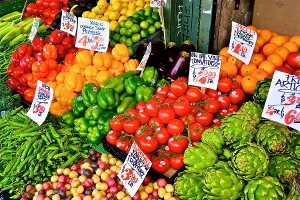| Description | Participants | Agenda | Summary | Products |
|---|
NIMBioS Investigative Workshop
Modeling Contamination of Fresh Produce

Topic: Modeling microbial contamination of fresh produce along the post-harvest supply chain
Meeting dates: April 24-25, 2014
Location: NIMBioS at the University of Tennessee, Knoxville
Organizers:
Yaguang Luo, Environmental Microbial and Food Safety Lab, USDA
Daniel Munther, Mathematics, Cleveland State Univ.
Objectives: Food borne diseases associated with fresh produce continue to cause serious difficulties for public health in North America. As globalization has broadened the food supply chain and increased its complexity, more sophisticated methods of surveillance are needed at key links to ensure the safety of fresh produce. In particular, recent studies have identified the sanitization juncture as well as packaging and shipping as important players that can promote contamination or even cross-contamination of produce. Focusing on each of these areas, our investigative workshop pursued four goals:
- Develop novel models that capture contamination and pathogen growth dynamics involved in sanitization, packaging and shipping.
- Discuss and develop multi-scale models that connect these supply chain links to form a global picture.
- Explore how these new models can aid in more relevant data collection to test and inform model predictions at both the local and global levels.
- Provide a venue for collaboration among mathematical modelers, food technologists, statisticians, microbiologists, and industrial and government agency representatives in order to synthesize knowledge in a way that establishes modeling as an indispensable tool for pathogen surveillance and control in the fresh produce industry.
Presentation Speakers, Titles and Abstracts
Modeling Contamination of Fresh Produce WordPress Site
Presentations were available for viewing via live streaming during the workshop.
Playlist of archived presentations
 Summary Report.
The first day of the workshop began with leaders from the produce industry highlighting contamination issues along the farm to fork supply chain, indicating the state of the industry, gaps in knowledge and potential modeling opportunities. In the afternoon, presentations discussed current models used, for instance by the FDA, and specific case studies involved in understanding pathogen detection as well as fresh produce sanitation/cross-contamination. After the presentations, three groups were formed to focus on developing models relevant to the following areas: 1) Pre-harvest pathogen contamination and prevention, 2) Post-harvest cross-contamination and interventions, and 3) Pathogen proliferation in distribution. The second day began with presentations that complimented group discussions on the previous day, exploring issues involved with pre-harvest and post harvest cross-contamination. After lively group deliberations, participants gathered again as one body to provide feedback on individual group reports. Currently, we are developing working groups that will be centered on one of the three areas listed above as well as discussing potential linkage between pre-harvest, post-harvest and distribution, to provide a more informed global picture of controlling contamination in the fresh produce supply chain.
Summary Report.
The first day of the workshop began with leaders from the produce industry highlighting contamination issues along the farm to fork supply chain, indicating the state of the industry, gaps in knowledge and potential modeling opportunities. In the afternoon, presentations discussed current models used, for instance by the FDA, and specific case studies involved in understanding pathogen detection as well as fresh produce sanitation/cross-contamination. After the presentations, three groups were formed to focus on developing models relevant to the following areas: 1) Pre-harvest pathogen contamination and prevention, 2) Post-harvest cross-contamination and interventions, and 3) Pathogen proliferation in distribution. The second day began with presentations that complimented group discussions on the previous day, exploring issues involved with pre-harvest and post harvest cross-contamination. After lively group deliberations, participants gathered again as one body to provide feedback on individual group reports. Currently, we are developing working groups that will be centered on one of the three areas listed above as well as discussing potential linkage between pre-harvest, post-harvest and distribution, to provide a more informed global picture of controlling contamination in the fresh produce supply chain.
Products
Publications
Castro-Ibanez I, Gil MI, Tudela JA, Ivanek R, Allende A. Accepted (2015). Assessment of microbial risk factors and impact of meteorological conditions during production of baby spinach in the Southeast of Spain. Food Microbiology.
Castro-Ibanez I, Gil MI, Tudela JA, Ivanek R, Allende A. 2015. Assessment of microbial risk factors and impact of meteorological conditions during production of baby spinach in the Southeast of Spain. Food Microbiology, 49: 173-181. [Online]
Knudsen GR, Dixon RD, Amelon SK. 2013. Potential spread of White-nose Syndrome of bats to the northwest: Epidemiological considerations. Northwest Science, 87(4): 292-306. [Online]
NIMBioS Investigative Workshops focus on broad topics or a set of related topics, summarizing/synthesizing the state of the art and identifying future directions. Workshops have up to 35 participants. Organizers and key invited researchers make up half the participants; the remaining participants are filled through open application from the scientific community. Open applicants selected to attend are notified by NIMBioS within two weeks of the application deadline. Investigative Workshops have the potential for leading to one or more future Working Groups. Individuals with a strong interest in the topic, including post-docs and graduate students, are encouraged to apply. If needed, NIMBioS can provide support (travel, meals, lodging) for Workshop attendees, whether from a non-profit or for-profit organization.
A goal of NIMBioS is to enhance the cadre of researchers capable of interdisciplinary efforts across mathematics and biology. As part of this goal, NIMBioS is committed to promoting diversity in all its activities. Diversity is considered in all its aspects, social and scientific, including gender, ethnicity, scientific field, career stage, geography and type of home institution. Questions regarding diversity issues should be directed to diversity@nimbios.org. You can read more about our Diversity Plan on our NIMBioS Policies web page. The NIMBioS building is fully handicapped accessible.
NIMBioS
1122 Volunteer Blvd., Suite 106
University of Tennessee
Knoxville,
TN 37996-3410
PH: (865) 974-9334
FAX: (865) 974-9461
Contact NIMBioS


